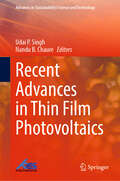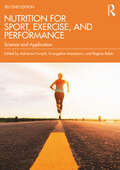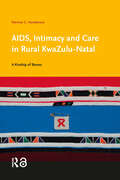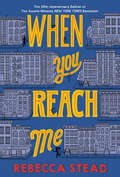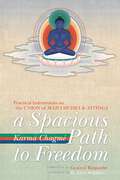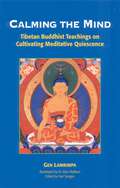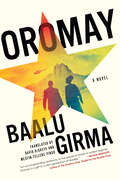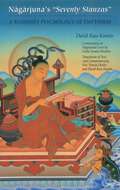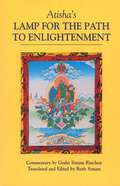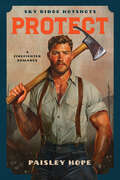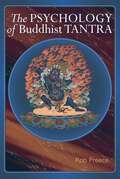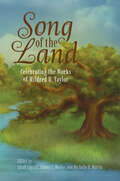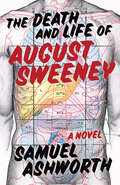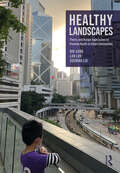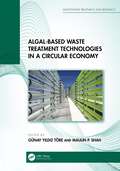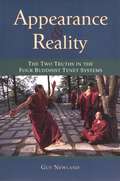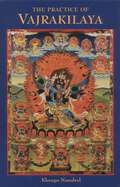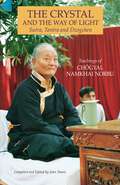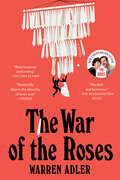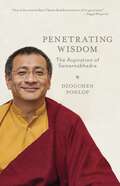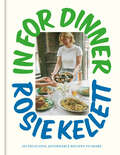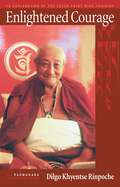- Table View
- List View
Recent Advances in Thin Film Photovoltaics (Advances in Sustainability Science and Technology)
by Udai P. Singh Nandu B. ChaureThis book provides recent development in thin-film solar cells (TFSC). TFSC have proven the promising approach for terrestrial and space photovoltaics. TFSC have the potential to change the device design and produce high efficiency devices on rigid/flexible substrates with significantly low manufacturing cost. TFSC have several advantages in manufacturing compared to traditional crystalline Si-solar cells like less requirement of materials, can be prepared with earth’s abundant materials, less processing steps, easy to dispose, etc. Several universities/research institutes/industry in India and abroad are involved in the research area of thin-film solar cells. The book helps the readers to find the details about different thin-film technologies and its advancement at one place. Each chapter covers properties of materials, its suitability for PV applications, simple manufacturing processes and recent and past literature survey. The issues related to the development of high efficiency TFSC devices over large area and its commercial and future prospects are discussed.
Nutrition for Sport, Exercise, and Performance: Science and Application
by Regina Belski Adrienne Forsyth Evangeline MantziorisNutrition for Sport, Exercise, and Performance offers a clear, practical, and accessible guide to building a comprehensive understanding of sport and exercise nutrition from leading experts in nutrition and exercise science. Nutrition before, during, and after training or a sporting event can improve the comfort, energy, and performance of athletes of all levels, from elite to recreational, as well as providing long-term health benefits. As such, nutrition is a key element of an athlete’s health and performance strategy, whether competing recreationally or at an elite level.Split into three parts, this new and revised edition of Nutrition for Sport, Exercise, and Performance provides an evidence-based introduction to nutrition for sport, exercise, and performance. Part I focusses on nutrition and sport science by explaining key principles underpinning sports nutrition science, including energy systems, exercise physiology and metabolism, and the digestion and absorption of macronutrients and micronutrients essential for performance and discusses factors influencing dietary intake, energy availability, and the process of dietary assessment. Part II is focussed on nutrition for exercise, pre- and post-training, hydration, supplements, and body composition measurement and modification. The final part (Part III) focusses on applied sports nutrition for a range of sports and athletes. This second edition delivers new insights into working with female athletes, occupational athletes, and athletes in contemporary sports including sport climbing, surfing, skateboarding, and breaking.Featuring contributions from a range of sport and exercise nutrition professionals with practical sports nutrition strategies and the latest evidence and practice guidelines, this is a core reference for undergraduate students, sports professionals, and aspiring athletes alike.
AIDS, Intimacy and Care in Rural KwaZulu-Natal: A Kinship of Bones (Care & Welfare)
by Patricia C. HendersonIn 2003-2006, Patricia Henderson lived in the South African province of KwaZulu-Natal where she recorded the experiences of people living with HIV/AIDS. In this illuminating study, she recounts the concerns of rural people and explores local repertoires through which illness was folded into everyday life. The book spans a period when antiretroviral medication was not available, and moves on to a time when the treatment became accessible. Hope gradually became manifest in the recovery of a number of people through antiretroviral therapies and ‘the return’ of bodies they could recognise as their own. This research implies that protracted interaction with people over time, offers insights into the unfolding textures of everyday life, in particular in its focus on suffering, social and structural inequality, illness, violence, mourning, sensibility, care and intimacy.
When You Reach Me: (Newbery Medal Winner)
by Rebecca Stead"Like A Wrinkle in Time (Miranda's favorite book), When You Reach Me far surpasses the usual whodunit or sci-fi adventure to become an incandescent exploration of 'life, death, and the beauty of it all.'" —The Washington PostThis Newbery Medal winner that has been called "smart and mesmerizing," (The New York Times) and "superb" (The Wall Street Journal) will appeal to readers of all types, especially those who are looking for a thought-provoking mystery with a mind-blowing twist.Shortly after a fall-out with her best friend, sixth grader Miranda starts receiving mysterious notes, and she doesn&’t know what to do. The notes tell her that she must write a letter—a true story, and that she can&’t share her mission with anyone.It would be easy to ignore the strange messages, except that whoever is leaving them has an uncanny ability to predict the future. If that is the case, then Miranda has a big problem—because the notes tell her that someone is going to die, and she might be too late to stop it. Winner of the Boston Globe–Horn Book Award for Fiction A New York Times Bestseller and Notable BookFive Starred ReviewsA Junior Library Guild SelectionA PARADE Best Kids Book of All TimeA Kirkus Reviews Best Middle Grade Book of the Century"Absorbing." —People"Readers ... are likely to find themselves chewing over the details of this superb and intricate tale long afterward." —The Wall Street Journal"Lovely and almost impossibly clever." —The Philadelphia Inquirer"It's easy to imagine readers studying Miranda's story as many times as she's read L'Engle's, and spending hours pondering the provocative questions it raises." —Publishers Weekly, Starred review
A Spacious Path to Freedom: Practical Instructions on the Union of Mahamudra and Atiyoga
by Karma ChagmeThis manual of Tibetan meditation simply and thoroughly presents the profound Dzogchen and Mahamudra systems of practice. Karma Chagmé sets forth the stages of meditation practice, including the cultivation of meditative quiescence and insight, the experiential identification of awareness, and the highest steps of Mahamudra and Atiyoga, leading to perfect enlightenment in one lifetime. Drawing from his enormous textual erudition and mastery of Tibetan oral traditions, he shows how these two meditative systems can be unified into a single integrated approach to realizing the ultimate nature of consciousness.
Calming the Mind: Tibetan Buddhist Teachings on the Cultivation of Meditative Quiescence
by Gen LamrimpaTo stabilize the mind in one-pointed concentration is the basis of all forms of meditation. Gen Lamrimpa was a meditation master who lived in a meditation hut in Dharamsala and who had been called to teach by the Dalai Lama. He leads the meditator step-by-step through the stages of meditation and past the many obstacles that arise along the way. He discusses the qualities of mind that represent each of nine levels of attainment and the six mental powers. This book was previously titled Shamatha Meditation.
Oromay
by Baalu GirmaA journalist finds himself embroiled in a disastrous government campaign as well as a sweeping romance in this landmark English translation of Ethiopia&’s most famous novel.An engrossing political thriller and a tale of love and war for readers of John Le Carré and Philip Kerr.December 1981, Ethiopia. Tsegaye Hailemaryam, a well-known journalist for the state-run media, has just landed in Asmara. He is on assignment as the head of propaganda for the Red Star campaign, a massive effort by the Ethiopian government to end the Eritrean insurgency. There, amid the city&’s bars and coffeehouses buzzing with spies and government agents, he juggles the demands of his superiors while trying to reassure his fiancée back home that he&’s not straying with Asmara&’s famed beauties.As Tsegaye falls in love with Asmara—and, in spite of his promises, with dazzling, enigmatic local woman Fiammetta—his misgivings about the campaign grow. Tsegaye confronts the horror of war when he is sent with an elite army unit to attack the insurgents&’ mountain stronghold. In the aftermath, he encounters betrayals that shake his faith in both the regime and human nature.Oromay became an instant sensation when first published in 1983 and was swiftly banned for its frank depiction of the regime. The author vanished soon thereafter; the consensus is that he was murdered in retaliation for Oromay. A sweeping and timeless story about power and betrayal in love and war, the novel remains Girma&’s masterpiece.
Nagarjuna's Seventy Stanzas: A Buddhist Psychology of Emptiness
by David Ross KomitoThis volume contains a translation of Seventy Stanzas, a fundamental work of Nagarjuna on the Madhyamika system of Buddhist philosophy, along with a commentary on it from the Prasangika viewpoint by Geshe Sonam Rinchen. David Komito summarizes basic Buddhist doctrines on perception and the creation of concepts, which have traditionally served as the backdrop for Nagarjuna's teachings about how people consistently misperceive and misunderstand the nature of the reality in which they live and the means through which they experience it. This book will interest Buddhist practitioners, scholars, and psychologists who seek a deeper understanding of Buddhist psychology and epistemology.
Atisha's Lamp for the Path to Enlightenment
by AtishaA key resource for modern-day Tibetan Buddhists, this lucid and engaging commentary distills the age-old wisdom of Atisha's celebrated overview of the Buddhist pathAtisha, the eleventh-century Indian Buddhist scholar and saint, came to Tibet at the invitation of the king of Western Tibet, Lha Lama Yeshe Wo, and his nephew, Jangchub Wo. His coming initiated the period of the second transmission of Buddhism to Tibet, formative for the Sakya Kagyu and Gelug traditions of Tibetan Buddhism. Atisha's most celebrated text, Lamp for the Path to Enlightenment, sets forth the entire Buddhist path within the framework of three levels of motivation on the part of the practitioner. Atisha's text thus became the source of the lamrim tradition, or graduated stages of the path to enlightenment, an approach to spiritual practice incorporated within all schools of Tibetan Buddhism.
Protect: A Firefighter Romance (Sky Ridge Hotshots)
by Paisley HopeA wildland firefighter reconnects in a second chance romance with his late best friend's sister, the one that got away, in the scorching hot book two in the BookTok viral Sky Ridge Hotshots series.&“Let me be your twin flame, love.&” I walk into the local bar with my hotshot crew, dirty and exhausted, only to slam into my biggest regret. The twin sister of my lost best friend and the one who got away, Violette Taylor. I haven&’t seen her in years, but I haven&’t forgotten her either. I used to be Rowan to her. Now, I&’m just King, the guy who broke her heart, but not for the reasons she thinks.Violette, a nurse and single mom, is back in town for good, and working hard to avoid anyone who reminds her of the past, especially a career hotshot like me. But when I fall into her care after an injury lands me in her burn unit, it feels like maybe it&’s fate. I know something she doesn&’t--life rarely offers second chances. I need to protect those I love. So, if this is my chance to make things right, I&’m taking it. Tropes: Firefighter romance / Angst / Small town romance / Forced proximity / Second chance romance / Friend to Lovers / Hurt Care / Workplace romance
The Psychology of Buddhist Tantra
by Rob PreeceThis book masterfully clarifies the nature of tantric practice. In contrast to the approaches of conventional religion, tantra does not attempt to soothe the turmoil of existence with consoling promises of heaven and salvation. The tantric practitioner chooses to confront the bewildering and chaotic forces of fear, aggression, desire, and pride, and to work with them in such a way that they are channeled into creative expression, loving relationships, and wisely engaged forms of life. In order to make the processes of tantra psychologically intelligible for a contemporary reader, Rob Preece makes judicious use of the work of modern psychotherapy, forging a compelling link between a Western tradition that hearkens back to the alchemical traditions of our own past and the comparably alchemical strategies of Tibetan Buddhist tantric practices. In keeping with the pragmatic and therapeutic aims of both psychotherapy and Buddhist meditation, The Psychology of Buddhist Tantra never loses sight of the central importance of applying these ideas to the concrete realities of day-to-day life. By illuminating the richly symbolic language of tantra through the intermediate language of psychology, The Psychology of Buddhist Tantra points to the transformative nature of tantric practices.
Stages of Meditation
by Kamalashila Dalai LamaA translation of the ancient classic Stages of Meditation, by Kamalashila, with commentary from everyone's favorite Buddhist teacher, the Dalai Lama.The Dalai Lama explains the principles of meditation in a practice-oriented format especially suited to Westerners. Based upon the middle section of the Bhavanakrama by Kamalashila--a translation of which is included--this is the most extensive commentary given by the Dalai Lama on this concise but important meditation handbook. It is a favorite text of the Dalai Lama, and he often takes the opportunity to give teachings on it to audiences throughout the world. In his words, "This text can be like a key that opens the door to all other major Buddhist scriptures." Topics include the nature of mind, how to develop compassion and loving-kindness, calm abiding wisdom, and how to establish a union of calm abiding and special insight.
Sally's Baking 101: Foolproof Recipes from Easy to Advanced
by Sally McKenneyNEW YORK TIMES BESTSELLER • The ultimate baking book for home cooks of all skill levels with 101 sweet and savory, foolproof recipes plus helpful tips for best results—from the creator of the beloved website Sally&’s Baking Addiction.&“Sally has a gift for creating recipes that bakers trust and that families and friends crave. There&’s so much to learn and so much to love here.&”—New York Times bestselling author Dorie GreenspanFor years, Sally&’s Baking Addiction has been the trusted online resource for anyone who wants to make delicious baked goods from scratch. An expert self-taught baker, Sally McKenney has been dedicated to developing and perfecting a wide range of baking recipes and her devoted audience trusts her implicitly. In this collection of 101 irresistible recipes, she presents an array of crowd-pleasing bakes to suit every occasion and craving, from cookies and bars to cakes, pies, breads, and brunch fare. Sprinkled throughout the book, you&’ll find a selection of her most treasured fan favorites, including Chewy Chocolate Chip Cookies, Strawberry Cake, Homemade Pizza Dough, and Classic Apple Pie.Sally shares everything you need to know to be a successful home baker including basic baking principles, tools and ingredients, detailed how-to&’s, and step-by-step photos. She also offers her best tips and tricks, such as how to brown butter, prepare your baking pans, freeze baked goods, test for doneness, and so much more. Simpler recipes are included if your time is limited or you&’re just beginning your baking journey, like Chewy Banana Walnut Cookies, Thick & Fudgy Brownies, Lemon Lavender Olive Oil Cake, and the Ultimate Fruit Crisp. Advanced bakers will be excited to try Cream Cheese Puff Pastry Danishes, Tiramisu Cake Roll, Sky-High Chocolate Mousse Pie, and Asparagus & Smoked Salmon Tart. Many of the recipes are somewhere in between, including Buttermilk Chive Fantail Rolls, Chocolate Peppermint Sandwich Cookies, Caramel Sheet Cake, and Butternut Squash & Sage Chicken Pot Pie.With Sally&’s Baking 101 as your guide, you&’ll gain the knowledge you need to feel confident baking from scratch with tempting, reliable recipes guaranteed to delight family and friends.
Song of the Land: Celebrating the Works of Mildred D. Taylor (Children's Literature Association Series)
by Michelle H. Martin Tammy L. Mielke Sarah LayzellContributions by Jennifer Ansbach, Jani L. Barker, Melissa Bedford, Helen Bond, Wanda M. Brooks, Susan Browne, Sabrina Carnesi, Emily Cardinali Cormier, Y. Falami Devoe, Bahar Eshraq, Latrice Ferguson, Catharine Kane, Michelle H. Martin, Devika Mehra, Ngozi Onuora, Lauren Rizzuto, Shelly Shaffer, Bryanna Tidmarsh, Ann Van Wig, Annette Wannamaker, and Raen Parker WashingtonA major figure in African American children’s literature, Mildred D. Taylor (b. 1943) has been publishing groundbreaking, award-winning books for fifty years, including Roll of Thunder, Hear My Cry; Song of the Trees; Let the Circle Be Unbroken; The Friendship; The Road to Memphis; and The Land. Taylor’s renowned Logan family saga has become a staple in classrooms and libraries, resonating internationally with its profound impact on readers. Her significance in literature extends beyond captivating storytelling. She has effectively illuminated the struggles and triumphs of African American families, challenging societal norms and shedding light on historical injustices. Through compelling narratives rooted in personal experiences and family history, Taylor has enriched the literary landscape and sparked crucial conversations about race, resilience, and the enduring power of love and courage in the face of adversity.Yet her significant literary contributions have not received the critical recognition they deserve. Seeking to fill that gap, Song of the Land: Celebrating the Works of Mildred D. Taylor brings together creative and critical responses to Taylor’s work and ongoing legacy. The chapters in this anthology represent an array of disciplines and theoretical lenses, highlighting the impact of African American children’s literature. Song of the Land is an invitation to learn more about Taylor’s work, which lays bare the dangers of white supremacy and racism in American society.
The Death and Life of August Sweeney
by Samuel AshworthThe Death and Life of August Sweeney, is the story of the rise, fall, and resurrection of a legendary American chef, told through his (utterly chaotic) autopsy at the hands of a woman he mysteriously hand-picked for the job. To write it, Ashworth spent time staging in Michelin-starred restaurants, and assisting with medical autopsies in hospitals.
Healthy Landscapes: Theory and Design Approaches to Promote Health in Urban Communities
by Bin Jiang Lan Luo Xueming LiuThis book responds to the need for a comprehensive and detailed theoretical framework and systemic design approaches to improve mental, physical, social, behavioral, and ecological health in urban environments.Although rapid urban development has created enormous economic and social value, it has also brought problems that have posed serious threats to the health of urban residents. Healthy Landscapes begins by reviewing practical experience, as well as theoretical and scientific evidence, from several related disciplines around the world. This is used to construct a provisional framework consisting of ten theoretical pathways for the environment to promote mental, physical,social, behavioral, and ecological health: Relieving mental stress; restoring direct attention; promoting environmental preference; promoting sublime and transcendent perceptions; promoting active lifestyles; preventing the spread of infectious diseases; promoting ecological services; enhancing social support; promoting the sense of belonging; and improving the sense of security. From these 24 theoretical pathways, the authors go on to identify 67 critical environmental characteristics for creating healthy communities, which are used to inform the design guidelines they go on to apply to community environment scenarios.This book will be an invaluable resource for students of landscape architectural design, architecture, and urban design. It will also be an essential tool for design professionals and urban administrators who want a comprehensive understanding of the fundamental theories of healthy communities with design guidelines supported by scientific evidence.
Algal-based Waste Treatment Technologies in a Circular Economy (Wastewater Treatment and Research)
by Maulin P. Shah Günay Yıldız TöreIn recent years, problems such as environmental pollution, global warming, and high energy consumption have brought waste treatment technologies to the forefront. As the scientific world turns to sustainable, environmentally friendly, and ecologically sound energy sources, microalgae-based technologies have become one of the most intensely studied subjects in academia. This book delves deeper into the emergence of microalgae as the green alternative that could lead the world toward adopting a circular economy and zero-discharge approach.With insights from professors and industry experts in the field, this book provides new perspectives on the day-to-day environmental applications of microalgal technologies in waste treatment and management as well as recycling. It also explores the environmental impact of traditional waste treatment and recovery technologies and highlights how algae-based technologies can serve as an eco-friendly alternative in microplastic removal and biofuel production. This book equips readers with the essential knowledge on algae-based phycoremediation technologies, with special emphasis on their use in conventional treatment facilities to remove harmful contaminants and stabilize pH for effective bacterial treatment.This is a valuable resource for environmentalists, scientists, and technologists around the world. It will also be of interest to academics and students within the disciplines of Phycology, Water Systems Engineering, Environmental Science and Remediation, and Sustainable Development.
Appearance and Reality: The Two Truths in the Four Buddhist Tenet Systems
by Guy NewlandWhen someone seeks to understand Buddhism, where should that person start? With the meaning of taking refuge in the three jewels? With the four noble truths? The Dalai Lama, when asked this question, suggested that for many in the West today, understanding the two truths—conventional truth and ultimate truth—is the best place to start. When the Buddha awoke from the dream we still dream, he saw the ultimate reality of things just as they are. There are shifting appearances and conventions, the manners and traditions of the vast and diverse world; and then there is the mystery of the sheer reality of things. And yet we cannot find this reality anywhere else but right here. Each system of Buddhist philosophy has its own way of explaining exactly what these two truths are and how they relate to one another. In exploring these systems, we are looking over the shoulders of Buddhist thinkers as they grapple with a basic question: 'What is real?' This is not an idle intellectual exercise but a matter which cuts to the heart of our practice in life.
The Practice of Vajrakilaya
by Khenpo Namdrol RinpocheKhenpo Namdrol presents a lucid and detailed explanation of the history and practice of Vajrakilaya.
The Crystal and the Way of Light: Sutra, Tantra, and Dzogchen
by Chogyal Namkhai NorbuA contemporary exploration of, and personal meditation on, the Buddhist tradition of Dzogchen and its many teachings for modern life—by an esteemed Tibetan masterIn The Crystal and the Way of Light, Chogyal Namkhai Norbu examines the spiritual path from the viewpoint of Dzogchen. He discusses the base path and fruit of Dzogchen practice, and describes his education and how he met his principal master who showed him the real meaning of direct introduction to Dzogchen.By interweaving his life story with the teachings, he both sets Dzogchen in its traditional context and reveals its powerful contemporary relevance. The book is richly illustrated with photos of Buddhist masters, meditational deities, and Dzogchen symbols.
Guru Yoga: According to the Preliminary Practice of Longchen Nyingtik
by Dilgo KhyentseWhy is the practice guru yoga (union with the nature of the guru) so important? Because with the help of the outer teacher, the inner teacher (the true nature of our own mind) is discovered. This particular guru yoga is called "The Wish-fulfilling Jewel," and it is the outer practice of the guru from the Longchen Nyingtik revelation of Rigdzin Jigme Lingpa. It was during a summer retreat in France in 1984 that Dilgo Khyentse Rinpoche gave teachings on this text. This is a new commentary and not a re-edit of teachings in the book The Wish-fulfilling Jewel.
The War of the Roses
by Warren Adler&“Terrifying, black-humored, black-hearted and bristling.&” —Gillian Flynn, New York Times bestselling author of Gone GirlNow a major motion picture, The Roses, starring Benedict Cumberbatch and Olivia Colman, Warren Adler&’s iconic 1980s tale of a crumbling marriage—an era&’s defining portrait of a macabre divorce.Jonathan and Barbara Rose are the perfect couple, living the dream in their beautiful house, filled with their precious antiques, their darling children, and their prized Ferrari in the garage. It&’s all any red-blooded American could possibly want. But when Jonathan experiences a sudden heart attack (or so he thinks) Barbara realizes that she wants a new life, without him. There&’s just one problem: they both want the house. For husband and wife, it&’s not just a residence: it&’s a passion, one that will escalate an ugly divorce into a full-blown battlefield, complete with weapons and casualties.In this viciously black comedy, the Roses will each do whatever they can to destroy their better half—no matter the cost to themselves . . .&“Brutally honest and darkly humorous, revealing the complexities of love.&” ― The New York Times&“A darkly twisted, sharply written, rabbit-hole of a story.&” ―Karin Slaughter,New York Times and #1 international bestselling author
Penetrating Wisdom: The Aspiration of Samantabhadra
by Dzogchen PonlopThis book is a commentary on an ancient, well-known Tibetan Buddhist prayer of aspiration that expounds on the Dzogchen path to enlightenment. Addressing such fundamentals as the guru-student relationship, the role of faith in Vajrayana Buddhism, recognizing basic awareness, and the notion of reality that is beyond mental concepts, it is a clear and accessible explication of a complex system of philosophy and meditation techniques that are central to Tibetan Buddhism. While the author is a traditionally trained master in the Tibetan Buddhist tradition, he has won great appreciation in the West for his humor and his familiarity with Western culture. He has lived and taught in Europe and North America for many years; Penetrating Wisdom is based on a series of talks he gave in Germany and the United States.
In for Dinner: 101 Delicious, Affordable Recipes to Share
by Rosie Kellett101 delicious and achievable, budget-friendly, vegetable-forward recipes made for communal eating and entertaining, from food writer, chef, and supper club host Rosie Kellett.Sharing a warehouse home in London with her six flatmates has taught supper club host and former Violet Bakery employee Rosie Kellett that making delicious food is possible on any budget. Rosie and her housemates cook and eat most of their meals communally: each person pays just about $30 per week to cover grocery costs and they take turns cooking each night, with everyone coming together to share a meal at the end of the day. Through this approach to cooking and eating, Rosie has come to cherish the physical act of sitting around a table with others, and she has learned how to feed a crowd with minimal effort, waste, and cost.With her first book In for Dinner, Rosie shares her affordable and approachable recipes that are designed for sharing—be it with friends, family, or yourself (leftovers!). From a flavorful and comforting Conchigliette with Porcini Mushroom Ragu and a bake-and-blend Roasted Carrot, Cumin, and Coconut Soup to an irresistible Hot Harissa Shakshuka and a delicious and endlessly customizable Dark Chocolate Raspberry Cake, Rosie is a pro at coaxing sophisticated flavors from humble ingredients. The recipes often serve up to eight and mirror the way Rosie and her housemates eat—mostly vegetarian with a little bit of fish now and again—to maximize affordability and nourishment, but the dishes are impressive enough to serve up at your next dinner party.While a communal lifestyle isn&’t everyone&’s reality, Rosie believes that coming together to share food is more economical and also creates joyful opportunities to connect at the end of each day.
Enlightened Courage: An Explanation of the Seven-Point Mind Training
by Dilgo KhyentseA practical guide to Buddhahood and Seven-Point Mind Training, the meditation practice at the very heart of the Tibetan Buddhist traditionHighly respected by thousands of students throughout the world, Dilgo Khyentse Rinpoche was one of the foremost poets, scholars, philosophers, and meditation masters of our time. Here he speaks frankly, drawing on his own life experience. Condensing the compassionate path to Buddhahood into practical instructions that use the circumstances of everyday life, Rinpoche presents the Seven-Point Mind Training—the very core of the entire Tibetan Buddhist practice.
